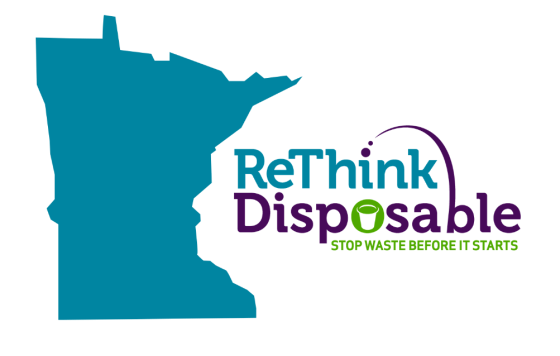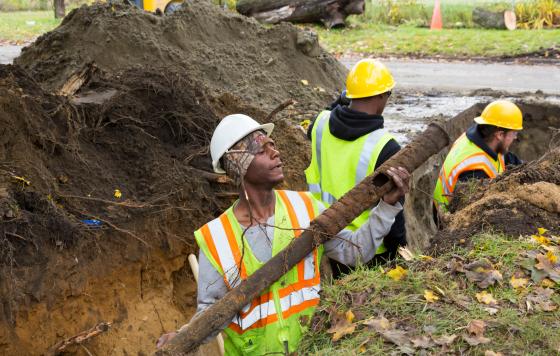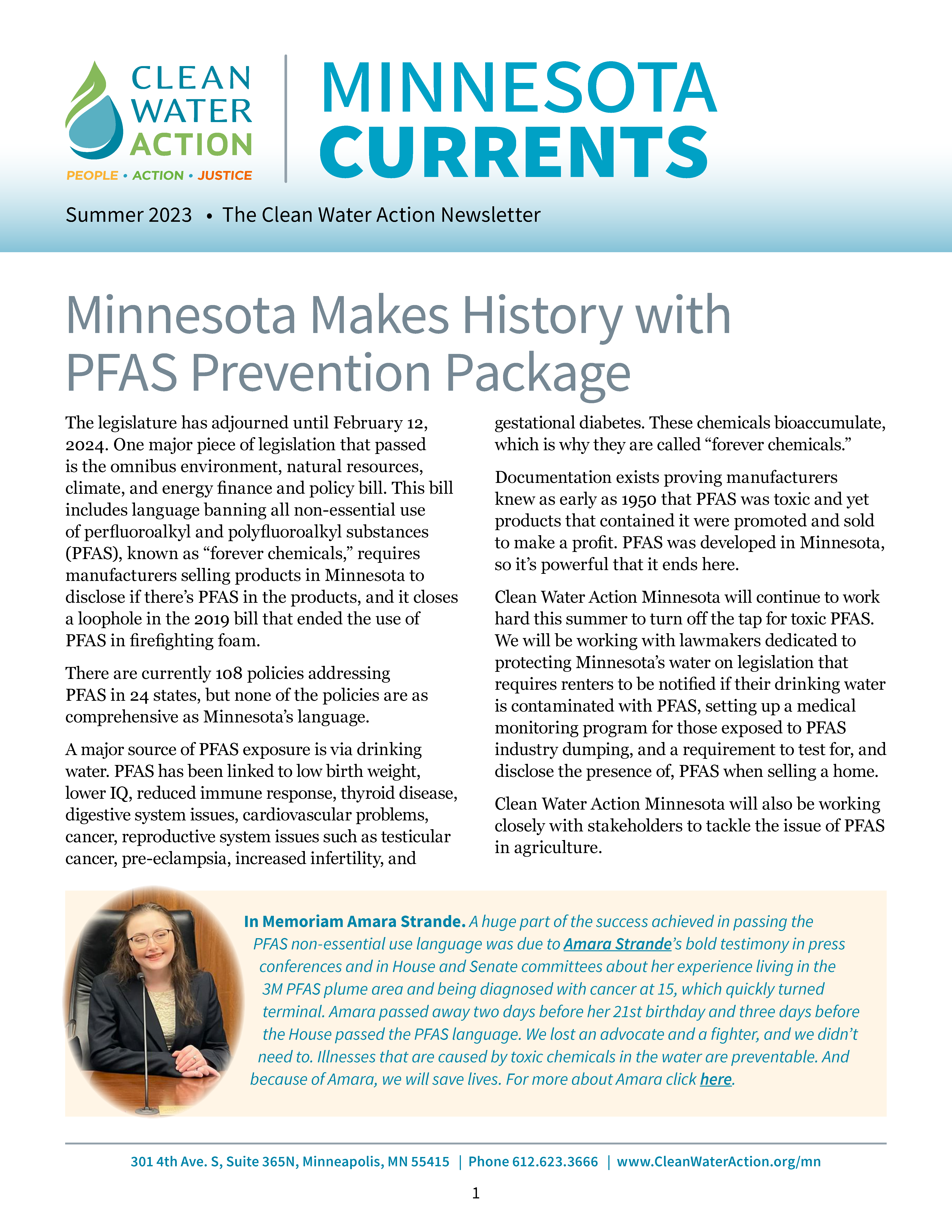In This Issue:
- Minnesota Makes History with PFAS Prevention Package
- In Memoriam: Amara Strande
- Cumulative Impacts and the Role Clean Water Action Is Playing in Environmental Justice Work
- ReThink Disposable In Minnesota: Meet Chloe!
- Progress on Lead Removal
- Thank You For Your Support This Year!
- Download a PDF of this issue
Minnesota Makes History with PFAS Prevention Package
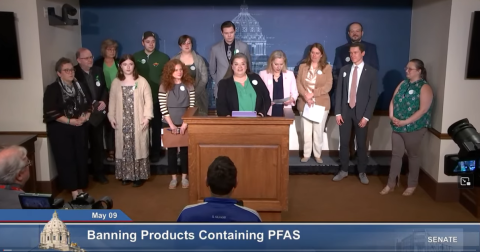
The legislature has adjourned until February 12, 2024. One major piece of legislation that passed is the omnibus environment, natural resources, climate, and energy finance and policy bill. This bill includes language banning all non-essential use of perfluoroalkyl and polyfluoroalkyl substances (PFAS), known as “forever chemicals,” requires manufacturers selling products in Minnesota to disclose if there’s PFAS in the products, and it closes a loophole in the 2019 bill that ended the use of PFAS in firefighting foam.
There are currently 108 policies addressing PFAS in 24 states, but none of the policies are as comprehensive as Minnesota’s language. A major source of PFAS exposure is via drinking water. PFAS has been linked to low birth weight, lower IQ, reduced immune response, thyroid disease, digestive system issues, cardiovascular problems, cancer, reproductive system issues such as testicular cancer, pre-eclampsia, increased infertility, and gestational diabetes. These chemicals bioaccumulate, which is why they are called “forever chemicals.”
Documentation exists proving manufacturers knew as early as 1950 that PFAS was toxic and yet products that contained it were promoted and sold to make a profit. PFAS was developed in Minnesota, so it’s powerful that it ends here.
Clean Water Action will continue to work hard this summer in Minnesota to turn off the tap for toxic PFAS. We will be working with lawmakers dedicated to protecting Minnesota’s water on legislation that requires renters to be notified if their drinking water is contaminated with PFAS, setting up a medical monitoring program for those exposed to PFAS industry dumping, and a requirement to test for, and disclose the presence of, PFAS when selling a home. Clean Water Action Minnesota will also be working closely with stakeholders to tackle the issue of PFAS in agriculture.
In Memoriam: Amara Strande
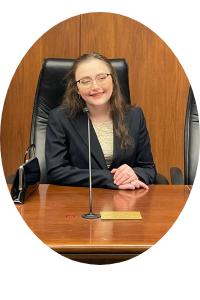
A huge part of the success achieved in passing the PFAS non-essential use language was due to Amara Strande’s bold testimony in press conferences and in House and Senate committees about her experience living in the 3M PFAS plume area and being diagnosed with cancer at 15, which quickly turned terminal. Amara passed away two days before her 21st birthday and three days before the House passed the PFAS language. We lost an advocate and a fighter, and we didn’t need to. Illnesses that are caused by toxic chemicals in the water are preventable. And because of Amara, we will save lives. For more about Amara, click here.
Cumulative Impacts and the Role Clean Water Action Is Playing in Environmental Justice Work
With the 2023 legislative session ending, Minnesota joins New Jersey and New York in passing cumulative impacts legislation. The Frontline Communities Protection Coalition (FCPC) and community groups have been organizing to pass strong environmental justice legislation to protect our overburdened communities from the many harms of pollution for years. The cumulative impacts bill will provide historically marginalized communities with additional protections from polluters and give the communities a much stronger say in whether or not certain air permits can be permitted if they will impact the community.
Sasha Lewis-Norelle, our environmental health and justice organizer, has been involved in this effort for over two years. This bill is the culmination of years of work, community advocacy and organizing, research, and building power at the legislature. We have worked with community partners, other organizations, the Minnesota Pollution Control Agency, legislative champions, and other stakeholders to pass this bill.
The bill also faced an uphill battle, despite having full Democratic control of the state legislature. Business interests and certain legislators attempted to stall or weaken the bill, fearing that it would give too much power to overburdened communities. It is thanks to the strong advocacy of our legislative champions and community/organizational support that we were still able to pass a strong cumulative impacts bill, with some limits.
While the community did not get everything we wanted in the final version, we were still able to pass a very strong environmental justice bill. The bill will now have to go through rulemaking, where many of the details will be fleshed out by the Minnesota Pollution Control Agency (MPCA). This is our biggest next step in ensuring that this environmental justice law stays strong. If we implement strong rules for this law, it will be one of the most ambitious environmental justice laws in the country.
There is still a lot of work to do in Minnesota towards advancing environmental justice. A big loss in the negotiations of this bill was the geographic limitations put on it, which limited the bill to the seven-county metro area, Duluth, and Rochester, with the option for tribes in Minnesota to opt into the policy. Every marginalized community deserves environmental justice, and we will continue fighting for overburdened communities across the state.
We are committed to continuing to fight for reducing pollution, empowering communities, and moving towards a more just and equitable world. There will always be more work to do, but at this moment we want to celebrate the victories of this session that will strengthen the foundation of environmental justice in our state.
The movement for environmental justice is only growing. There are countless groups and organizations that are committing to center justice within the work that they do, and supporting marginalized communities that are fighting for their own justice. The cumulative impacts bill has always been community centered. The bill has been led by groups working within environmental justice communities and supported by allies. Learn more about the Frontline Communities Protection Coalition (FCPC) and the work we do.
ReThink Disposable In Minnesota: Meet Chloe!
Chloe Kintop, a recent graduate from Augsburg University where she received her degree in economics and political science, joined the Rethink Disposable team as a Minnesota organizer in May.
ReThink Disposable aims to prevent waste before it starts by working with local governments, businesses, institutions, and consumers to reduce single-use disposable products in the food service sector. In doing so, we conserve resources, prevent waste, and mitigate litter pollution in our waterways. Disposable food and beverage packaging makes up 67 percent of litter on commercial streets. The world produces 380 million tons of plastic every year, of which up to 50 percent is for single-use purposes. If we don’t end the throw-away lifestyle now, there will be more plastic than fish in the ocean by 2050!
In 2011, a case study was conducted in the San Francisco Bay area to collect litter at six sites. Volunteers and staff captured nearly 12,000 pieces of trash littered on the streets in commercial districts within four cities. 67 percent of what was collected was food and beverage packaging. Concluding the study, the California Clean Water Action office launched ReThink Disposable. Currently, there are over 380 small businesses and 13 institutions including school districts, universities, and corporate campuses participating in the program. There are around 22.3 million pieces of single-use items omitted every year from the waste stream and over $675,000 in annual savings realized by participants. After having great success, the program is expanding nationwide to six additional Clean Water Actions offices, including Minnesota.
Our goal is to reduce five to eight million pieces of single-use foodware over 18 months by converting local restaurants and schools from single-use disposable plastics to reusables. We will accomplish this goal by helping businesses assess what reusables are necessary, give free technical assistance by handling the product research, delivery, set up, and by removing all out-of-pocket costs. Data shows reusables can help save businesses $3,000 to $21,000 per year. When businesses make the switch, it elevates the dining experience for the customers. The food tastes better on real plates and attracts customers who want planet-friendly options. In the end, we will help save money, save water, and save the planet.
Chloe is excited to get connected with people in the community and across the state, to help businesses save, and reduce the waste at the source in Minnesota!
Progress on Lead Removal
This legislative session we saw (and helped) Minnesota take major strides in addressing lead in our water, homes, and communities. Lead is an incredibly harmful toxin, with children, infants, and pregnant people being most at risk if exposed to lead. Lead is rarely used in products or materials now but has a lasting legacy from its previous use in paint, pipes, and gasoline.
There are three primary ways people are exposed to lead: paint, water from lead pipes, and lead in soil. Many houses built before the 70s and 80s have lead paint, a lead water service line, or both. Houses near highways and busy streets may have lead in the soil from when leaded gasoline was common.
This session, Minnesota passed $240 million in funding to replace lead service lines across the state. This will supplement the federal funds from the Infrastructure Investment and Jobs Act and set us on the path to replacing all lead service lines in the state by 2033.
We also passed funding for lead remediation in schools and childcare facilities, lowered the action level of lead to 3.5 micrograms, and created a lead safe housing fund. These provisions will all help move us towards a state where everyone is safe from the harms of lead poisoning.

Thank You For Your Support This Year!
Together we made a big difference for Minnesota — and we’re just getting started. Help us reach our summer fundraising goal so we can keep winning for our water and our communities!

